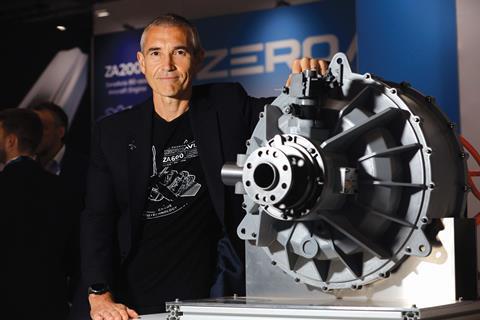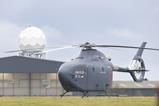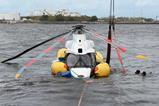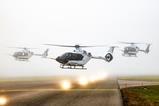ZeroAvia remains on track to achieve certification for its ZA600 powertrain towards the end of 2025, leading to service entry aboard the Cessna Caravan around six months later in mid-2026.
Val Miftakhov, ZeroAvia chief executive, says the firm continues to make progress, with the first production-conforming components for the electrical generation and propulsion systems to be built “into next year”.

That should result in certification towards the end of 2025 or the beginning of 2026, he says, “although we might adjust it”, describing the target as “aggressively realistic”.
“It is possible, but it requires that everything goes as planned and no major iterations of the design are needed and there are no new findings [from testing].
“No plan survives the first contact with the regulator, but we are beyond the first contact.”
Initial certification is being sought for the 500-700kW-rated ZA600 with a supplemental type certificate following for its installation in the Caravan.
That activity has been supported by a partnership agreement between ZeroAvia and Textron Aviation, the owner of the Cessna brand, “which is working really well”.
“Their engineering teams are involved in all aspects of the integration,” adds Miftakhov, which includes the location of the hydrogen fuel tanks below the fuselage.
ZeroAvia’s progress comes against a backdrop of a tough funding climate for start-ups, including the recent demise of rival Universal Hydrogen.
In the days following Universal Hydrogen’s collapse, ZeroAvia announced it had secured additional backing from American Airlines as part of its Series C funding round.
Miftakhov declines to specify how much the company is raising through its Series C round but says it “over $100 million” and “takes us within shouting distance of certification”. An exact figure will be disclosed when the round closes in the coming months, he says.
In addition, ASL Aviation – a customer for both Universal Hydrogen and ZeroAvia – at Farnborough signed a conditional purchase agreement for up to 20 ZA2000 engines for retrofit into its ATR fleet.
The firm order for 10 engines, plus 10 options, builds on an earlier agreement between the two companies announced in November 2021.
ZeroAvia will also begin shipping components from its powertrain – electric propulsion units, for example – to other aircraft developers in 2025 and 2026, leading to earlier service entry than for the full powertrain.
Although this will provide an early source of revenue, the “biggest impact is [cutting] the cost of capital, says Miftakhov.
“The first commercial service for anything from a company like ours is a step change, like a 10x event for the company.”
Access to cheaper capital is crucial given the significant investment required for its engine development roadmap, he adds.
The company has been further boosted by the award of £10.5 million ($13.5 million) in UK Aerospace Technology Institute funding for the development of high-temperature fuel cell technology.































